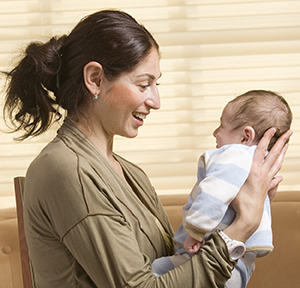Gastroesophageal Reflux (GER) and GERD in Newborns
Gastroesophageal Reflux (GER) and Gastroesophageal Reflux Disease (GERD) in Newborns

Babies with severe reflux have gastroesophageal reflux disease (GERD). A baby with GERD may spit up too much and not get enough nourishment from food. The baby can also aspirate (breathe in) spit-up liquid. This can cause problems with the baby’s breathing.
When does reflux disease need treatment?
Reflux is treated if the baby:
Has breathing problems. These include apnea, or breathing that stops for 20 seconds or more at a time. Other problems include noisy breathing or pneumonia that comes back.
Is growing poorly
Is very irritable or fussy, or seems to be in pain when spitting up
Is vomiting blood or has signs of blood in the stool
How is reflux disease treated?
Feeding changes. This may include feeding smaller amounts more often, and burping more often during feedings. In other cases, allowing more time between feedings may help. You may need to stop drinking milk or using dairy products if you are breastfeeding. You may need to give your baby a special formula if you are not breastfeeding.
Propping the baby up after feeding. For 30 minutes after feeding, put your baby so that his or her head is higher than the stomach. In the hospital, the baby may be put on his or her stomach (prone). Note: It is OK to lay the baby prone in the NICU because the baby is being closely watched. Unless told otherwise, once at home, you should put the baby to bed on his or her back to help prevent SIDS (sudden infant death syndrome).
Medicines. This may include medicines to lower the amount of acid in the stomach. This keeps the stomach acids from damaging the esophagus. Other medicines may be used to speed up digestion, so food passes out of the stomach quicker.
Surgery. In severe cases, a surgery called a Nissen fundoplication may be done. The surgery makes the valve at the top of the stomach stronger. It does this by wrapping part of the stomach around the esophagus. When the stomach is relaxed and empty, food can pass through. When the stomach is full, pressure closes the valve.
What are the long-term effects?
In most cases, reflux gets better over time and causes no long-term problems.
Updated:
September 29, 2017
Sources:
Gastroesophageal Reflux in Infants. UpToDate., Gastroesophageal Reflux: Management Guidance for the Pediatrician. Lightdale JR. Pediatrics. 2013;131(5):e1684-95.
Reviewed By:
Freeborn, Donna, PhD, CNM, FNP,Image reviewed by StayWell art team.,Lee, Kimberly G, MD, MSc, IBCLC